|
Interview With Gendrickson Mena
Blue Note, June 8th 2007
By: Eva
Simontacchi
Pictures: Mario Livraghi
|
 |

Eva Simontacchi:
You've been living in Italy for 12 years now. How has your music evolved since
you left Cuba to come to live and play here in Italy? You have surely been influenced
by different musical languages here in Europe….
Gendrickson Mena:
I have obviously been influenced. Sometimes you look back, and you think: "Oh! I
haven't improved in my playing, my music hasn't evolved" (as I believe many musicians
happen to think), so I believe that it is very important to look back and be aware
of one's progresses. I believe that these past 12 years in Europe have been very
important for my studies and evolution. I arrived on July 1st
1995.
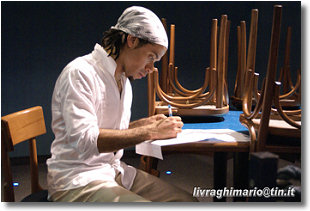 I
always look back, but I also look ahead. I have kept on learning and studying, studying
the technique, the language, the phrasing. I also took advantage of the possibility
of having all the information I wanted here. In Cuba we don't have a great possibility
to follow many artists and their projects as we do here in Europe. So I had the
chance to study the evolution and the progress of very many artists, because I had
the possibility to have their records and to listen to their music. Many of the
artists whose music I had listened to when I was a child, I had the chance to see
them live here in Europe. I
always look back, but I also look ahead. I have kept on learning and studying, studying
the technique, the language, the phrasing. I also took advantage of the possibility
of having all the information I wanted here. In Cuba we don't have a great possibility
to follow many artists and their projects as we do here in Europe. So I had the
chance to study the evolution and the progress of very many artists, because I had
the possibility to have their records and to listen to their music. Many of the
artists whose music I had listened to when I was a child, I had the chance to see
them live here in Europe.
E.S.: Who for example? Which artists did you
have the chance to know better through wider information and means?
G.M.: For example, I listened to the music of George
Benson, Earth Wind and Fire, Petrucciani, Freddy Hubbard (trumpet player),
Oscar Peterson – I remember that when I was a child my father used to play
his records – Ron Carter, Miles Davis, Coltrane, etc. I also owe a
lot to my father, Pedro Mena, guitar player, arranger, composer, multi-instrumentalist.
I learnt very much from him when we were in Cuba, but also when we came to Italy
because I went on playing with his orchestra during the first years in this country.
He has always been a very important point of reference in my life. I realized I
had evolved conspicuously in these past 12 years. What I understood up to a certain
point in 1995, I understand much more in depth
and completely now. I am also talking about the languages and the different ways
of playing. For example, I understand much better and in detail any one of Coltrane's
solos now. I understand what he meant to do, musically speaking; I understand when
he's playing atonally, I understand on which scales he worked, the phrasing, so
I thoroughly enjoy every single solo I listen, and every single artist. Many years
ago I couldn't divide the instruments or the arrangements when I was listening.
Now I listen to a record and I can make out every single instrument, and I can hear
everything. I don't want to seem presumptuous, but I realize I have really worked
a great deal on this in the past 12 years.
E.S.: You have sharpened your ear!
G.M.: Yes, I can make out all the chords even when
the soloist, over the piano, plays these harmonic passages, I understand the game
passing from one chord to the next. Sometimes they do these wonderful things and
phrasings, that not everyone can understand them. Many people love the sound and
say: "Oh I love jazz!", but it's wonderful if you can understand what an artist
does when he expresses himself, both melodically and rhythmically, and also as far
as colors are concerned. For example, a trumpet player, in order to add color may
hold a long tone that may be a note which is shared by four or five different chords
that follow one another, and holding it for four or five chord progressions he may
attain a beautiful color and sound, even for fast phrasings. So I had this great
opportunity, and I thank God for having spent all these years in Europe because
I had the chance to deepen my studies and learn much more. I am still studying very
much, and watching many videos of many different artists and listening to many records.
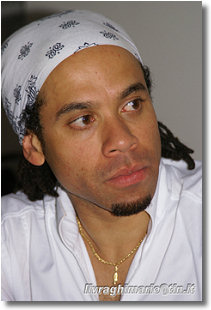 When
I arrived, in 1995, my playing was a bit less
profound and a little more elementary. My phrasing was a little simpler. Now I realize
my phrasing is more interesting. An artist's phrasing should evolve and mature as
time goes by. I realize my playing has changed also because of the flugelhorn. Many
people think that the flugelhorn is like the trumpet, but it's a totally different
instrument. The flugelhorn has overtones, it is mellower. In my opinion it is very
important for a trumpet player to learn how to play the flugelhorn too, because
it engages you in a different way, but this way – and this is interesting – also
affects the way you play the trumpet and it enriches your playing both ways. These
instruments are two different planets that help each other evolve in both directions.
Since the sound of the flugelhorn is darker, you really have to change your way
of playing. I bought my flugelhorn in the year 2000,
and the first year while I was trying to get used to it, I remember that it was
a disaster because it's so different! You have to use more breath because the mouthpiece
is wider, and the change from one mouthpiece to the other is not so simple. Moreover,
the way you hold the two instruments when you are playing is different. During the
first year I kept making mistakes because I couldn't master the sound. I had to
work a great deal and study a lot. You know, I studied technique and improvisation
on the trumpet, but - this is quite funny – I never technically studied the flugelhorn.
I played for countless hours on the jazz minus one tracks. After my daily exercises
with the trumpet I used to work with the flugelhorn in this way, and used to play
it for a couple of hours. I think that this is a way you can learn how to play it….
Without studying it as a technical instrument, but rather playing it, and experiencing
it directly. So, I am certain that the study of the flugelhorn also contributed
to my evolution. In the year 2000 I still played
with Tony Martinez, and they immediately realized that my playing had changed
and evolved. When
I arrived, in 1995, my playing was a bit less
profound and a little more elementary. My phrasing was a little simpler. Now I realize
my phrasing is more interesting. An artist's phrasing should evolve and mature as
time goes by. I realize my playing has changed also because of the flugelhorn. Many
people think that the flugelhorn is like the trumpet, but it's a totally different
instrument. The flugelhorn has overtones, it is mellower. In my opinion it is very
important for a trumpet player to learn how to play the flugelhorn too, because
it engages you in a different way, but this way – and this is interesting – also
affects the way you play the trumpet and it enriches your playing both ways. These
instruments are two different planets that help each other evolve in both directions.
Since the sound of the flugelhorn is darker, you really have to change your way
of playing. I bought my flugelhorn in the year 2000,
and the first year while I was trying to get used to it, I remember that it was
a disaster because it's so different! You have to use more breath because the mouthpiece
is wider, and the change from one mouthpiece to the other is not so simple. Moreover,
the way you hold the two instruments when you are playing is different. During the
first year I kept making mistakes because I couldn't master the sound. I had to
work a great deal and study a lot. You know, I studied technique and improvisation
on the trumpet, but - this is quite funny – I never technically studied the flugelhorn.
I played for countless hours on the jazz minus one tracks. After my daily exercises
with the trumpet I used to work with the flugelhorn in this way, and used to play
it for a couple of hours. I think that this is a way you can learn how to play it….
Without studying it as a technical instrument, but rather playing it, and experiencing
it directly. So, I am certain that the study of the flugelhorn also contributed
to my evolution. In the year 2000 I still played
with Tony Martinez, and they immediately realized that my playing had changed
and evolved.
 When
I started playing the trumpet, and I started working on the standards, I used to
listen to a great trumpet player, Freddy Hubbard. I loved his sound. He used to
play the flugelhorn a great deal, and I guess that his sound and his way of playing
still dwell in me today and has surely affected me even though I listened to many
other trumpet players in my life. When I started working on jazz improvisation,
I didn't know where to start, so I started transcribing all of Freddy Hubbard's
solos and learning them. I started studying my instrument at 10 years of age, but
when I started studying jazz and improvisation I was 15 years old, and that's when
I started learning Freddy Hubbard's solos. I also love to listen to other musicians
and other instruments. For example, if you listen to a guitar player, many things
change: the phrasing, the concept, the sound, so I have learnt to listen to guitar
players, piano players, drummers, and all the other instrumentalists. Many people,
when listening to a drummer's solo, experience a more visual approach, but if you
really listen to a drummer's solo, you can find a melody, and the logic and meaning
of a solo. Sometimes a drummer has a message that he wishes to convey, but very
few really understand him. Even among percussionists, with the congas and the timbales,
you can have melodies, as with singers. So, I went on working not only on melodies
but also on rhythm. So even if this is an interview, When
I started playing the trumpet, and I started working on the standards, I used to
listen to a great trumpet player, Freddy Hubbard. I loved his sound. He used to
play the flugelhorn a great deal, and I guess that his sound and his way of playing
still dwell in me today and has surely affected me even though I listened to many
other trumpet players in my life. When I started working on jazz improvisation,
I didn't know where to start, so I started transcribing all of Freddy Hubbard's
solos and learning them. I started studying my instrument at 10 years of age, but
when I started studying jazz and improvisation I was 15 years old, and that's when
I started learning Freddy Hubbard's solos. I also love to listen to other musicians
and other instruments. For example, if you listen to a guitar player, many things
change: the phrasing, the concept, the sound, so I have learnt to listen to guitar
players, piano players, drummers, and all the other instrumentalists. Many people,
when listening to a drummer's solo, experience a more visual approach, but if you
really listen to a drummer's solo, you can find a melody, and the logic and meaning
of a solo. Sometimes a drummer has a message that he wishes to convey, but very
few really understand him. Even among percussionists, with the congas and the timbales,
you can have melodies, as with singers. So, I went on working not only on melodies
but also on rhythm. So even if this is an interview,
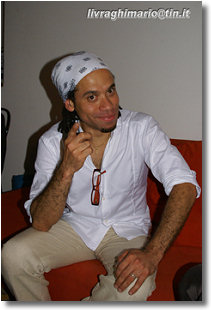 I
would like to suggest to all jazz students or musicians not to dwell only on their
instruments thinking "I'm a vocalist so I'll listen only to vocalists and voices",
because this way of reasoning won't give you a complete concept of music and of
the way you can express yourself. I believe that if any musician listens to all
the instrumentalists, from the sax player to the trumpet player to the trombone
player, everything he will listen will enrich him more and more and will give him
new ideas. Another good suggestion is that of listening to very many music styles.
If a jazz player also listens to funky music, reggae, rock, Chinese music, and so
on, apart from the fact that he will surely be personally enriched by all these
different sounds and moods, he will also develop new ideas when composing and arranging,
because all that you've listened to becomes part of your experience, and it becomes
so much easier and natural to create different sounds, moods or colors. Sometimes
one studies a lot, for days and months, and doesn't experience a great change at
the moment. But even though it might not happen immediately, it will happen as the
years go by. The results will show, and that's when a musician realizes he has evolved.
Sometimes you may happen to think: "Wow, I did this without even realizing!" I
would like to suggest to all jazz students or musicians not to dwell only on their
instruments thinking "I'm a vocalist so I'll listen only to vocalists and voices",
because this way of reasoning won't give you a complete concept of music and of
the way you can express yourself. I believe that if any musician listens to all
the instrumentalists, from the sax player to the trumpet player to the trombone
player, everything he will listen will enrich him more and more and will give him
new ideas. Another good suggestion is that of listening to very many music styles.
If a jazz player also listens to funky music, reggae, rock, Chinese music, and so
on, apart from the fact that he will surely be personally enriched by all these
different sounds and moods, he will also develop new ideas when composing and arranging,
because all that you've listened to becomes part of your experience, and it becomes
so much easier and natural to create different sounds, moods or colors. Sometimes
one studies a lot, for days and months, and doesn't experience a great change at
the moment. But even though it might not happen immediately, it will happen as the
years go by. The results will show, and that's when a musician realizes he has evolved.
Sometimes you may happen to think: "Wow, I did this without even realizing!"
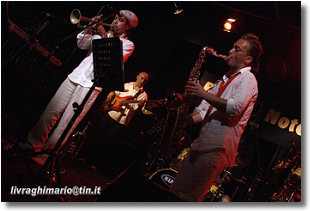 So,
in these 12 years I really worked on all these aspects. I am quite a curious person,
and in these years I also had the possibility (that I didn't have in Cuba) to see
many of the artists I admire live. I went to countless concerts even outside Italy,
and these have been very important and very strong experiences that dwell with you
all your life. I am a researcher and I love to explore and experiment, and I love
to listen to great musicians that really move me and inspire me. In these 12 years
I experienced a lot, not only studying and listening, but also playing with very
many artists and projects. I have been lucky because I had the opportunity to play
in so many different projects. Sometimes these projects were not exactly what I
was wishing to pursue, but they have enriched me all the same, not only musically,
but under a personal and human point of view too. So,
in these 12 years I really worked on all these aspects. I am quite a curious person,
and in these years I also had the possibility (that I didn't have in Cuba) to see
many of the artists I admire live. I went to countless concerts even outside Italy,
and these have been very important and very strong experiences that dwell with you
all your life. I am a researcher and I love to explore and experiment, and I love
to listen to great musicians that really move me and inspire me. In these 12 years
I experienced a lot, not only studying and listening, but also playing with very
many artists and projects. I have been lucky because I had the opportunity to play
in so many different projects. Sometimes these projects were not exactly what I
was wishing to pursue, but they have enriched me all the same, not only musically,
but under a personal and human point of view too.
When I worked with Vinicio Capossela and other great artists, I
learnt a lot from them on stage. I observed how these big leaders behaved on stage,
what they said, how they moved, how they behaved in different situations, and this
is also very important. One should not only go on stage and play all the notes he's
been studying for a lifetime. One has to know how to behave, how to organize the
concert, how to convey a message. It's not only a question of playing. Many musicians
just play and stay still, but in my opinion it is also wonderful to have a bit of
show going on, creating atmospheres. I learnt all these things, and I'm still learning,
and I saw many great artists such as Miles Davis, Santana, and others do
it.
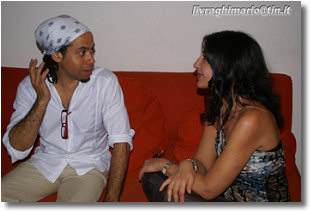 I
am not saying it with presumptuousness, but I realize I have evolved quite a lot
since my arrival 12 years ago, even though I know that I still have to go on improving
and evolving. So I'll go on working because I know I have much to give but I also
know that I still need more experiences, I need to know new people, new projects,
because this is the only way to grow. I believe one should play many different musical
styles and experience a lot, from the music of the Balkans to the Chinese, Indian
or Russian music, for example. These are all sounds and influences that will come
out later in life in the compositions of an artist. With Capossela I learnt the
music from Macedonia and the Croatian countries, and the way you play the trumpet
in this kind of music is so very different, it's not at all similar to the jazz
trumpet. By the way, it is very very difficult. So, I believe he passed on to me
this way of playing that sometimes comes out spontaneously when I play, but I don't
decide it rationally. It's an experience that has become a part of me. This tipe
of knowledge just comes out now and then and it's very interesting, so my advice
is to experience different types of music, playing African music too, even though
there might not be harmony in the music! Go and play with 20 percussionists and
3 brass instruments! I
am not saying it with presumptuousness, but I realize I have evolved quite a lot
since my arrival 12 years ago, even though I know that I still have to go on improving
and evolving. So I'll go on working because I know I have much to give but I also
know that I still need more experiences, I need to know new people, new projects,
because this is the only way to grow. I believe one should play many different musical
styles and experience a lot, from the music of the Balkans to the Chinese, Indian
or Russian music, for example. These are all sounds and influences that will come
out later in life in the compositions of an artist. With Capossela I learnt the
music from Macedonia and the Croatian countries, and the way you play the trumpet
in this kind of music is so very different, it's not at all similar to the jazz
trumpet. By the way, it is very very difficult. So, I believe he passed on to me
this way of playing that sometimes comes out spontaneously when I play, but I don't
decide it rationally. It's an experience that has become a part of me. This tipe
of knowledge just comes out now and then and it's very interesting, so my advice
is to experience different types of music, playing African music too, even though
there might not be harmony in the music! Go and play with 20 percussionists and
3 brass instruments!
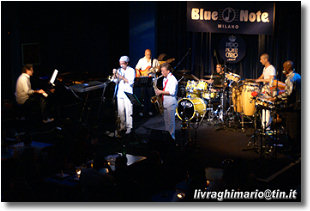 You
may also do things like this! Can you just imagine how much you could be rhythmically
enriched by such an experience? I tell you, a great deal! And you can use it when
you're playing bebop! Do you know that tune, "One Note Samba"? Well, if you pay
attention, there's one note playing; that's Africa! You are working on one note
and the chords shift, but you're still on that note that is working rhythmically.
And to me this is a good idea, rather than playing many notes that have already
been played. You can mix, and play a game with notes and rhythm. So, I am very happy
with my European experience, because I made very different experiences and learned
a lot, and when you happen to go to places where there's people that appreciate
this music, you can be there with a greater knowledge and be a step further. You
may also do things like this! Can you just imagine how much you could be rhythmically
enriched by such an experience? I tell you, a great deal! And you can use it when
you're playing bebop! Do you know that tune, "One Note Samba"? Well, if you pay
attention, there's one note playing; that's Africa! You are working on one note
and the chords shift, but you're still on that note that is working rhythmically.
And to me this is a good idea, rather than playing many notes that have already
been played. You can mix, and play a game with notes and rhythm. So, I am very happy
with my European experience, because I made very different experiences and learned
a lot, and when you happen to go to places where there's people that appreciate
this music, you can be there with a greater knowledge and be a step further.
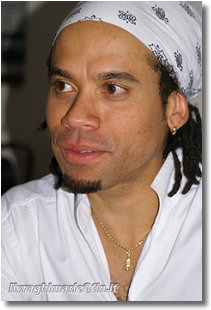 E.S.:
We talked about the past. Now we'll talk about the future. What are you
aspiring after? What are your musical dreams? E.S.:
We talked about the past. Now we'll talk about the future. What are you
aspiring after? What are your musical dreams?
G.M.: I would like to go on developing this music,
because being Cuban, of course, I cannot abandon my origins. Even if at times I
don't feel like playing salsa, these origins pulse in my veins. So, this comes out
even when I'm playing jazz, so I'm a little more powerful, I have a little more
energy that comes out in my playing. So I aspire after going on with my music which
is latin jazz, with Caribbean influences, you know, Cuban music, and adding other
influences such as bebop, funky, fusion, acid jazz, jungle, and mix all these influences
together. I think that it is always possible to create something new and original,
some new sound. So my idea is that of modernizing Cuba's latin jazz, because I know
many groups that play latin jazz, but they play it the traditional way with 3 percussions,
piano, double-bass and wind-instruments. But I believe that latin jazz may be played
with keyboards, rock guitar, effects, always with this particular underlying rhythm.
But it is possible to work on an evolution of latin jazz, because I believe it should
evolve. Why play it as Poncho Sanchez or Mongo Santamaria or Tito Puentes?
It should evolve and be renewed, it should be updated by adding all these jungle,
acid-jazz and world-music influences; in my opinion it will become more interesting.
I would love to bring this music around the world, and record many albums… I would
love to find somebody who could follow me and who could help me realize these dreams
and to bring this huge project – because it won't be only instrumental, there will
be voices too, because I believe that with vocalists and with lyrics it will reach
the audiences far better – around the world. I am also thinking about starting to
sing myself, so I'll start studying and taking voice lessons. I am also going on
with my piano studies and exercises to keep in good shape and on my arrangements.
I would also like to realize a record with a big band, but not with the traditional
big band. I would like a big band record with a totally different sound, making
the saxes or the trombones work in a different way, with other rhythmic patterns,
with a different overall sound, something more interesting. You can also change
the way of playing the trumpet on a latin jazz funky tune. The only problem is that
it is very difficult to find someone that can understand this concept. Some people
just say:"hey, you're not playing right, this is not traditional!" But it's not
true. Probably this new concept will create some thing new and different in the
future. Sometimes the people who criticize don't stop to think that it might be
something new, and it takes years, normally for something new to be appreciated
and accepted. So, when you're still living, very few people understand what you're
doing. So, this is my dream. I would love to be listened by audiences round the
world, make good music with beautiful arrangements, meaningful lyrics. I am not
interested in ordinary commercial music. I love beautiful music with a powerful
and meaningful content, pleasing to the ear, and I would love the people to go away
feeling happy and enriched after the concert.
E.S.: A personal question now… What are your
strengths?
G.M.: I've got a strong will. I never get tired
of pursuing a goal that I have in my heart. Sometimes I might get a little weaker
and seem to be losing my will in difficult times, but I still go on studying and
working. Luckily these moments never last too long. I think that all the experiences
in life, good or bad, but especially the bad ones, help you go on with an even stronger
determination. Another strength I've got is that I know what I love to do and what
I would like to become, so this gives me a lot of will and determination too. Just
like at times I feel a little insecure, there are times in which I feel very strong
and creative because I realize
 I've
got new and very personal and innovative ideas. This at times causes me to be misunderstood
by people that are more inclined to accept the traditional and more common or ordinary
ideas. But of course I realize that since I'm not a big international name, I cannot
be easily understood and appreciated. If I were as famous as Quincy Jones
with his same age and experience, and I proposed the very same idea, probably people
would listen to me and I would be more credible and reliable. So I guess the will
is my n.1 strength. Sometimes I don't even know where it comes from. Even when I
don't feel like doing anything I still go on! I'm not lazy. I don't like to work
with lazy people who lack in creativity and that wait until the very last moment
to do things. I worked with this kind of people quite often, but I don't like it,
and I will try not to work again under these circumstances. I've
got new and very personal and innovative ideas. This at times causes me to be misunderstood
by people that are more inclined to accept the traditional and more common or ordinary
ideas. But of course I realize that since I'm not a big international name, I cannot
be easily understood and appreciated. If I were as famous as Quincy Jones
with his same age and experience, and I proposed the very same idea, probably people
would listen to me and I would be more credible and reliable. So I guess the will
is my n.1 strength. Sometimes I don't even know where it comes from. Even when I
don't feel like doing anything I still go on! I'm not lazy. I don't like to work
with lazy people who lack in creativity and that wait until the very last moment
to do things. I worked with this kind of people quite often, but I don't like it,
and I will try not to work again under these circumstances.
E.S.: What about your weaknesses?
G.M.: One of my weaknesses is that I tend to not
listen to my inner voice when I'm asked to do things. Sometimes I realize I'm going
against my will doing things that I don't really want to do and that don't belong
to me. I tend to say too many yeses, but I really have to learn to say no. At times
I'm a little to weak and undecided. This is a weakness I have to strengthen, and
I'm working on it. Sometimes I'm a little selfish, like when I insist on doing an
arrangement like I feel it should be done, but I realize that this may be a slightly
presumptuous attitude, because the other person's idea could be ok too. My idea
could even not be the best one. Another weakness of mine is that I accept suggestions
from everybody, and sometimes these suggestions or criticisms might not be totally
constructive. I have my own ideas on what I would like to do, so I should not listen
too much to what everybody says. I'm also working on this.
E.S.: Ultrasound released your
2003 album "Asi Son
Mis Sentimientos", but I know that you have other album projects which
are ready, both as a soloist and as a group (Gendrickson
Mena & The New Cuban Experience). When do you think they may be issued?
G.M.: As soon as I will find someone who is interested
in producing me, either a recording company or a producer. Even though I'm not known
at an international level, I'm not known around the whole world, I would love to
be produced internationally, because this is the objective of creating an album.
My first record was issued thanks to this producer and musician – Stefano Bertolotti
– who loved my music and believed in me. He has a very small recording company,
and he produced my record. But it is very difficult to find it in the shops, and
this doesn't help at all a young musician that aspires to be known. It is important
to be well distributed, because people who don't know you get the chance to listen
to your music and to buy your CD. In this way an artist could start having fans
and being appreciated more widely. I really hope I will find someone who will produce
me. I have two or three self-produced recording projects that are ready, so I'm
looking for a recording company or a producer. Recording companies and producers
should give young musicians an opportunity, and I'm not only talking about myself.
There are plenty of talented young musicians out there, and they deserve the possibility
to have their say. Of course Ron Carter and
Herbie Hancock are truly great, they are giants, but it is also right
to start working on the young and still unknown talents that might make important
changes in music.
E.S.: Could you tell us something about your
group "Gendrickson
Mena & The new Cuban Experience"?
G.M.: I am really happy I am working with these musicians. They have given
me so much! There's a wonderful energy between us. Part of what I am now I owe it
to them all, to their contributions during the rehearsals, the arrangements, the
energy, the will of working even when the economical situations were not so promising.
They always gave their very best with enthusiasm. We have recorded this first album,
and we will very soon record another album, and we will produce it. So I really
thank them with all my heart. My idea was that of playing latin jazz not only with
Cubans. This is what makes my project special, because it has an American, European
and Cuban sound, because these Italian artists have brought their cultural contribution
to this project. My energy, mixed to theirs, with Jorge and Hidelvis on percussions
leads to a very interesting sound. It's not the latin jazz of Tito Puentes
or Ed Palmieri. When I will have produced 2 or 3 records this will be clearer.
In my opinion we are creating a very personal and particular sound. I think and
hope I will play with them for a long time, because we had an amazing evolution
since we started. I think that this is the objective of an artist, no matter whether
we're talking about a singer or a trumpet player: to keep a project for a very long
time, which might span up to 20 or even 30 years, because then there's going to
be an amazing evolution both as a group and personally.
Insert an opinion
|
© 2000 - 2026 All the material published on Jazzitalia is exclusively owned by the author. Moreover it is protected by International Copyright, so it is forbidden any use of it which isn't authorised by the rights' owner.
|
This page has 2.813 hits
Publishing Date: 09/12/2007

|
|

